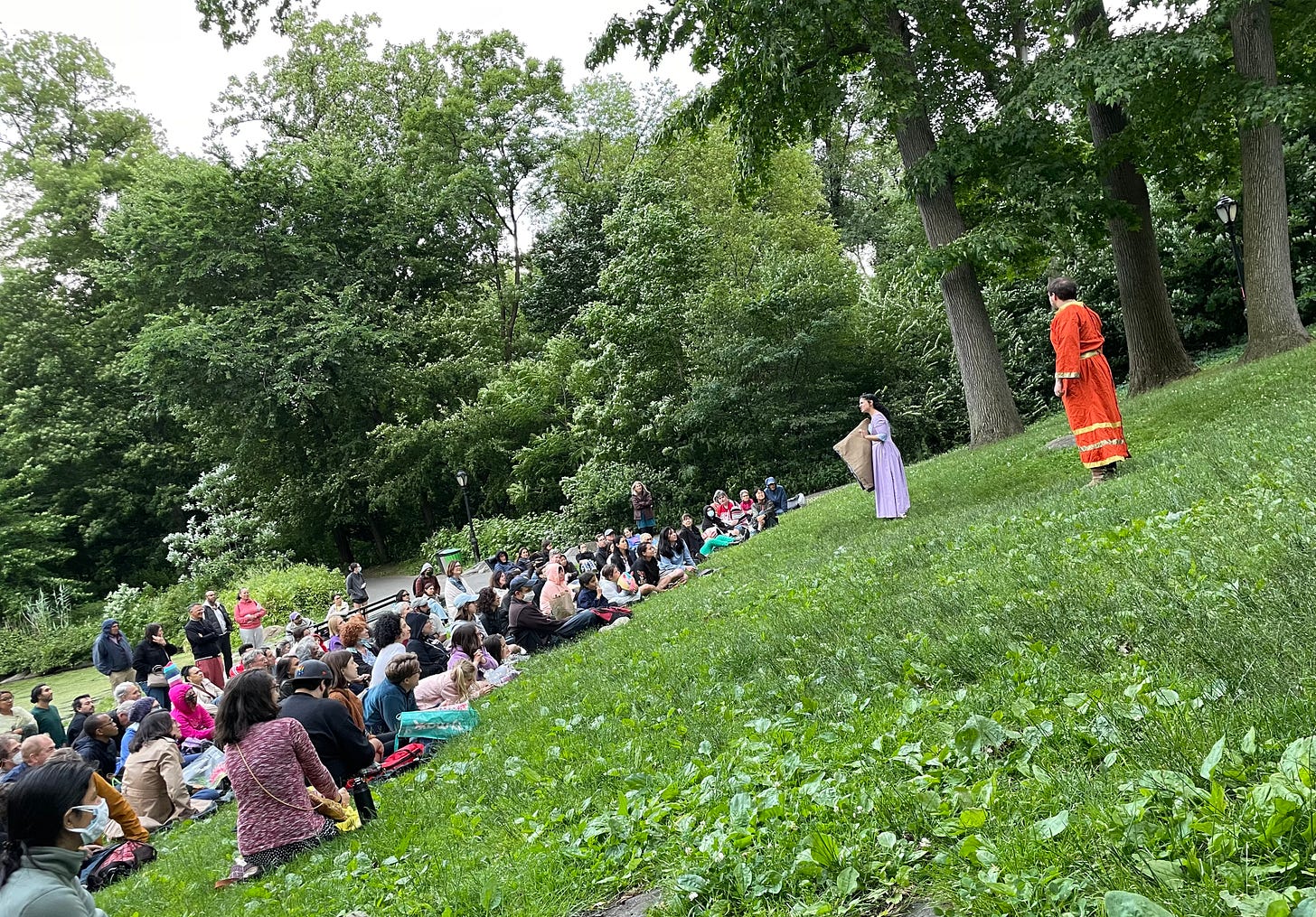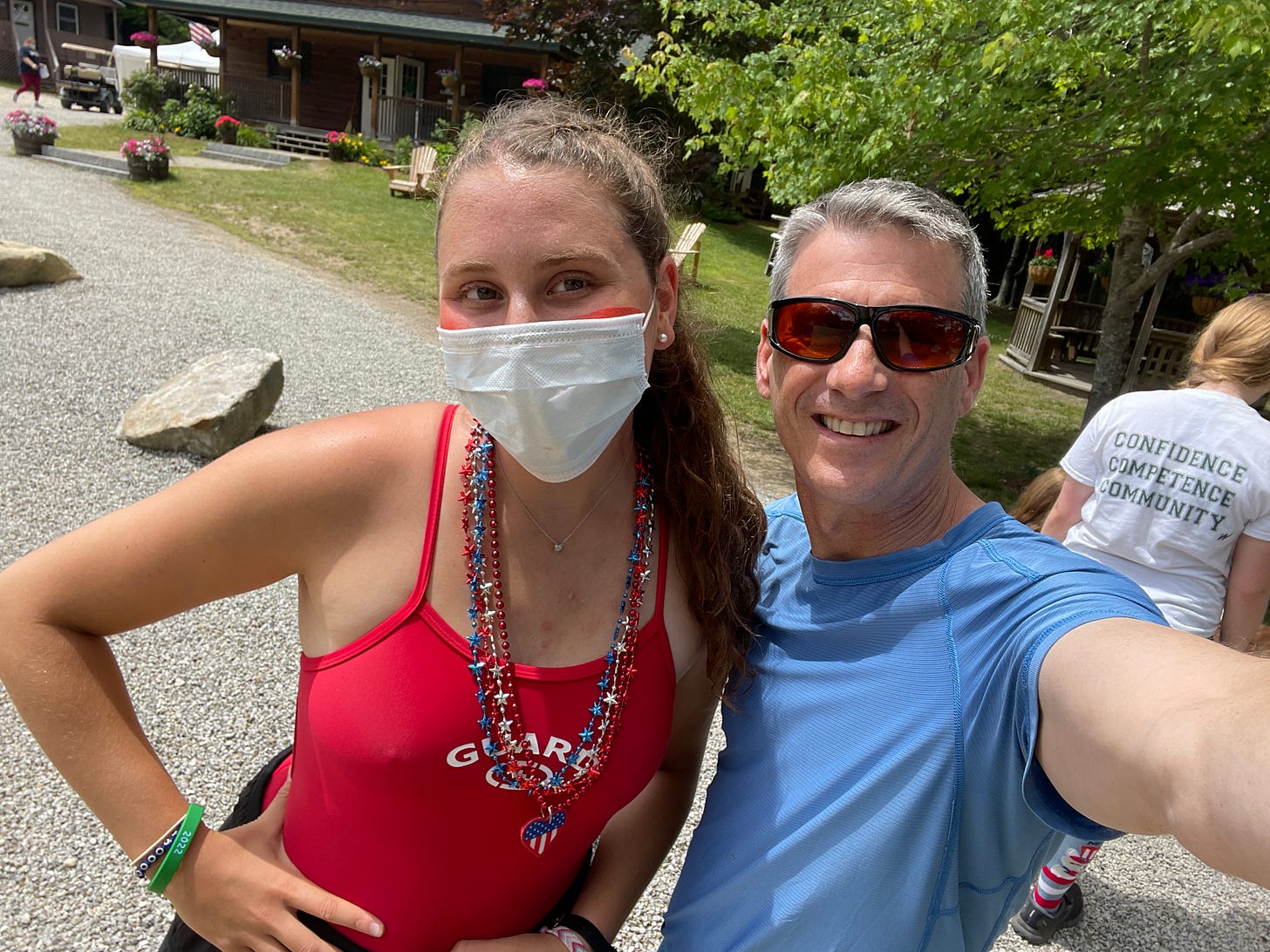©photo by Bertie
It’s summer in the City, the season of camps, programs, jobs and internships. Our two college-age daughters flirted briefly with applying to an internship but their hearts weren’t in it. Neither were ours, to be honest. Rachel and I preferred that they get real jobs.
In the end, we gave them the green light to take the jobs they truly wanted: counselors at their summer camp, Wicosuta, in Hebron, N.H., where their younger sister, Georgia, is still a camper.
Camp Wicosuta is probably the best parenting decision we ever made. Everyone deserves a Xanadu in life. Once, in the dark of winter, amidst the pressures of middle school, I asked Noa if she ever thought about Wico at that frigid time of year. She looked at me with surprise, “Don’t you know I think about it every day?”
As counselors at Wico they are each responsible for supervising a bunk of girls and coaching in an area of expertise. For Noa it’s waterfront, for Dani, tennis. The hours are long, the pay basic, the responsibility real. No doubt the experience will be valuable wherever they end up.
And where will that be? Neither they nor we have any idea. But they will sometimes ask - big surprise - if we think they should go to med school. “I hear that medicine is not what it used to be,” Noa says with mock gravity, “Do you really want your kids to be doctors?”
“Let me reframe the question,” I respond: “What do I want my kids to get from work and does medicine fit the bill? What should you look for in a career? What do I want you to find? If work and love are the cornerstones of our humanness, as Freud put it, then it pays to get them right.”
“Ok, so what is ‘right’ when it comes to work?” Noa asks, inviting me to spin a theory, as she knows I like to do. I take the bait.
Right work is like a stool with three legs, each necessary but not sufficient, each providing stability to the whole: purpose, parnasa, and personality.
First, purpose. Everyone tells you to follow your passion. Ignore them. Passion is like happiness - the more you chase it the more elusive it becomes. Forget yourself and look around. The world is full of problems. Pick one that matters - don’t worry, you will never run out of good candidates - and try to solve it. Let purpose lead and passion follow.
Second, parnasa, a Hebrew and Yiddish word used primarily in Orthodox Jewish circles. Roughly translated, it means a livelihood. Parnasa is not a calling, not a passion, not a mission - it’s a living.
Whatever else it does, right work should pay the bills.
I like how parnasa knocks the ideal of work down a notch, takes the pressure off, reminds us that there are other things in life - love for example - that work is meant to serve, scaffold and nourish.
I also like how the concept of parnasa can undermine the hierarchy between different professions. A “good parnasa” is subsidiary to a good life, elevating the dignity of work in general and leveling the status of work in particular.
Third, personality. You should enjoy what you do and the people who do it with you. It should fit your personality, natural talents and proclivities.
When med students ask me for advice on how to choose a specialty, I counsel them to do a gut check. What type of person are you? Generalist or specialist? Cerebral or technical? Medical or surgical?
Every specialty has its “type”. By the fourth year of med school you’ve met them all. Who felt like your people? It’s a gestalt thing, not to be overthought. It’s also a good hedge. If you enjoy your coworkers and the mechanics of the job, that can compensate for a lot down the road.
For me, Family Medicine has the three elements of right work. I love the intellectual process, the tangible practice, and my fellow health care workers. Even in the most frustrating moments I feel a sense of purpose. And while the business side of private practice is admittedly not what it used be, it still pays the bills.
Here’s a thought experiment, a litmus test that I would want my kids to pass with their careers one day: if I won the lottery would I still want to see patients? Lucky for me the answer is, yes.
Nevertheless, medicine is not the best job I ever had.
That distinction belongs to my old summer job as a lifeguard at the now-defunct Harbor Island Spa, in Long Branch, N.J.
It was the 1980’s and I was a teenage boy. The pay was minimal but there was free food and drinks, tips for setting up beach chairs and umbrellas, and my expenses were low. One time a flashy Sopranos-type who we were told was Fat Tony Salerno gave me a hundred dollar tip, which I will never forget. I sat on the supersized lifeguard chair on the beach and, like Yertle The Turtle, felt like “ruler of all that I see!”
I mostly basked in the sun, chatted with friends, and dutifully scanned the bathers in the sea. On my breaks and after work, if the conditions were good (never a sure thing on the Jersey shore), I would surf.
Sometimes I waded in to help a senior citizen who was battling the waves. Occasionally we had to rope off the water for rip tides, algae, or, rarely, a shark sighting. Once I saved a dog who swam out too far. And there was always the exciting prospect of saving an real human life (which never actually happened, oh well).
That job had it all: purpose, parnasa, personality… and passion.
I try to sum up. “So what I want is-” but Noa cuts me off.
“Wait, let me guess,” and sure enough she nails it: “Med school would be great, if it’s the right fit. But what you really want is to see us be lifeguards….”




We love your stories. Always look forward to reading them. Thank you!
I love the choice of photo at the top. Is there a parnasa element in the wandering upper-Central Park Shakespeare thespian job? (Is it always Shakespeare?)
Bravo, another inspiring post. Thanks for sharing!